- Home
- Amelia C. Adams
An Agent for Esme Page 4
An Agent for Esme Read online
Page 4
“So, if he didn’t return your feelings, you wouldn’t be upset?”
“Of course I would, but at least I’d have my answer without all that silly conjecturing and pulling petals off daisies to tell my fortune.”
He nodded. “That makes sense to me. I return to my previous question, though—why do you assume that I know more about romance than you do?”
He sounded a little miffed, and she hoped she hadn’t blundered by speaking her thoughts so freely. “I just assumed that since you’re a man, you would have had any number of opportunities to entertain young ladies throughout your life.”
“My being a man somehow increases my chances at romance?”
“You have the ability to seek it out, whereas ladies must wait to be approached.”
“Hmm.” He seemed to mull that over. “You’re right, and it’s a shame, really. Women should be able to ask for dances just as easily as men do, and women should also be free to take the initiative and guide their partners outside for moonlight strolls. I rather think I’d be delighted if a young woman asked me to dance. It would make me feel wanted rather than tolerated.”
He understood what she was trying to say . . . How lovely. She’d been worried that she’d have to find some way to explain it, men largely being Neanderthals and whatnot.
“So now that we’ve discussed the ills of the world in regards to gender expectations, what can we do about it?” she asked. “I’m afraid we’re far too forward-thinking for society at large to go along with us.”
“And I’m afraid you’re right. We’re simply too ahead of our time.” He looked thoughtful again. “We could start by addressing each other by our Christian names. I understand married couples do that all the time.”
“Do they? Well, I suppose we must follow suit. I just . . . Is there anything else in the world you could call me besides Esme?”
He tapped his chin with his finger. “I could call you Elda, but that doesn’t sound very nice. What about Mer? No? What about . . .”
“You know, let’s just say that I surrendered,” she interjected. “I don’t believe we’ll ever arrive at the same conclusion, and you should be able to call me whatever you want. I, however, reserve the right not to answer if I find your choice of words in some way offensive.”
“Let’s consider it done,” he replied. “It’s nice to meet you, Esme.”
She wanted to shudder, but she was very pleased with herself for only wincing the tiniest bit. “You too, Matthew,” she replied. Perhaps now they could get to work.
***
The hotel Agent Bleaker had asked them to use was quite a lot nicer than what they’d experienced on the journey in from Denver, and Esmerelda exhaled with relief when they entered their room and found it bright and airy. She hid her smile when Matthew checked the sheets again. He must do that wherever he stayed. It wasn’t a bad idea—there were few things more unpleasant than discovering a dirty bed when you were exhausted and needed to rest.
“Did Agent Bleaker say how long it would be before he contacted us?” Matthew asked.
Esmerelda shook her head. “Just that he’d be in touch. I hope he doesn’t have to go to extraordinary lengths, but if the identity of every single agent in the office has been compromised . . .”
She didn’t finish her sentence, and she didn’t have to. They could both fill in the rest of the sentence—those agents could end up dead if they ran afoul of the organization.
That made it all the more crucial that they find Robert White as soon as possible.
“Do you think—” she began.
“Hmm?” Matthew looked up from the newspaper he’d picked up in the lobby. “Did you say something, dear?”
“Oh, hush. I was just wondering if Agent White gave up the names of the other agents. Do you suppose he’s being tortured?”
“Maybe the agents weren’t as careful about maintaining their covers as they should have been.”
“But a whole office of agents being so careless? Do you think that means Agent Bleaker isn’t training them correctly? He would be the common thread between them all.”
Matthew put down the paper. “This is a new train of thought. Has something occurred to you?”
“I don’t know if I’d say that, exactly . . .” Esmerelda sat down on the edge of the bed. “But now that we’re here, my attention has shifted from the logistics of getting here to the case itself, and I’m ready for more answers.” She paused. “Why are you reading the newspaper, of all things? Aren’t you thinking about the case at all?”
“I’m thinking about it quite a bit.” He pointed to an advertisement toward the back. “Do you see this?”
“Of course not. You’re clear across the room.”
He stood up and showed her the wording. Felix desires to meet Thurs. 7pm 1 ton. “This isn’t an ad for a mail-order bride,” he said. “This is a message from one criminal to another arranging their next meet. I always read the newspaper when I travel—you never know what you might discover.”
“So, who is this Felix? Is he involved in our case, or a different one?”
“We’ll have to ask Agent Bleaker if that name has come up yet. I’ve picked out another three ads that look promising, and we’ll run them all past him.” He resumed his chair and turned the page.
Esmerelda stood and walked over to the window. The landscape here was different from anything she’d ever seen before. The dirt had a red glow to it, and the buildings were a combination of wood and adobe brick. The settlers had taken the very ground they walked on and transformed it into walls and barricades—she imagined that was necessary because trees didn’t seem to be plentiful, so with the absence of wood, they had to be inventive.
Their bedroom was decorated to match the exterior view—the colors of Santa Fe were woven into their rug and painted onto the walls. Such a difference from her home in Chicago, where everything was hectic and chaotic, everyone rushing to be on time and taking little notice of the beauties that surrounded them every day.
“So, you said I could interrogate you in return,” she said, facing Matthew again.
“I did say that, but I wasn’t done interrogating you.” He set his paper to the side and leaned forward, resting his elbows on his knees. “Should I finish up, or should we take turns?”
“I can’t see that it makes a difference as long as we both get our chance.”
“Very well—I might as well finish. Let’s see.” He leaned back again and crossed one ankle over the opposite knee. “You were raised by a mother who felt things should be done a certain way and a father who was more easygoing. You concentrated on school to stay on your mother’s good side, but you spent quite a lot of time with your father. When your father died, you chose to veer off on a different path from what your mother had chosen for you. Have I summed it up correctly so far?”
She hadn’t wanted to admit it before, but he was actually quite close, so she nodded.
He steepled his fingers and tapped his lips with them. “That brings me to my next question, and likely the most obvious—how did you end up becoming a Pinkerton?”
“It was an accident, actually,” she said. “I was taking one of my father’s pistols to the gunsmith—I noticed that the hammer was jammed when I dusted it. As I walked inside the shop, I noticed two men there asking the gunsmith some questions about how to identify which gun had shot which bullet. They were Pinkertons investigating a case, but I didn’t know that at the time. I thought their conversation was fascinating, so I joined in, and the next thing I knew, they’d invited me down to the office. I was asked to help out with a special need on a case, and now . . . here I am some time later, fully trained and finding a purpose in my life that I’d never had before.”
“And how did your mother feel about that?” Matthew asked.
He did have a way of getting right to the heart of the matter. “She wasn’t pleased,” Esmerelda replied after a pause. “She thinks I’ve lost all my senses, and that I can hard
ly be considered a proper lady anymore. In fact, she won’t even tell her friends where I am—she’s made up a story that I’ve gone back east to tend an ailing aunt.”
“Is that something more along the lines of what a proper lady would do?”
“Oh, yes. And I’d be embroidering pillow covers at the same time.”
“I see. You know, I’ve never understood the appeal of embroidered pillow covers—it seems like a lot of work for something that will just get sat upon.”
“Those are my feelings exactly. If we’re going to be completely honest, I think they’re a way of keeping ladies occupied with something mindless while the men go out and do all the truly exciting things like making laws and starting corporations. If women had those same opportunities . . .” She pulled in a deep breath. “I’m sorry. I have strong opinions, and it’s difficult to rein them in.”
“I’d rather talk to someone with strong opinions than someone who doesn’t know what they think.”
They both looked up when a knock sounded on the door, and Matthew rose to answer it.
“I’ve brought your tray of tea, sir,” the young chambermaid said.
He glanced at Esmerelda over his shoulder, his question plain. No, she hadn’t ordered any tea, and she lifted a shoulder in reply.
“Thank you,” he told the young woman, taking the tray from her and closing the door again. Then he set the tray on the bedside table, studying it.
“What’s this?” Esmerelda asked, coming up next to him and spotting the edge of a piece of paper sticking out from beneath the teapot.
He pulled it out and unfolded it, then held it so she could read it too. Alley back of hotel 8 pm exit through kitchen.
“I suppose we’re to assume this is from Agent Bleaker.” Esmerelda looked it over once more for any sort of signature. “Seems a bit . . . Oh, I don’t know. Yes, we’re private investigators, but alleyways at night with no signature—it seems a bit melodramatic, don’t you think?”
“If Bleaker’s been compromised and he’s seen speaking with us, we’ll be compromised too. Is that a risk you really want to take?” Matthew asked.
“Of course not. I just . . .” She exhaled, trying to find the words to describe what she was feeling. There was an itch in her spine, something that didn’t feel right, but that made no sense because they’d only just now reached their destination. They hadn’t met their contact, they hadn’t even begun to establish their story—she had no call to be feeling uneasy this early in the game, and yet she was.
“You just feel like something’s off,” Matthew finished for her.
“Yes, that’s it exactly.” She paused, lifting an eyebrow. “I’m not sure what’s come over us, Agent Harrison. We actually seem to be agreeing with each other more often than not today.”
“Oh, I wouldn’t let it concern you. It probably won’t last,” he replied mildly.
They took advantage of the fact that it was hours until dinner to bathe and rest. Esmerelda wished their room had a private bath, but while the hotel was nice, it wasn’t quite that nice, so she made do with what was available. She felt much better afterwards, and she had to admit, Matthew looked nice when he returned to the room, freshly shaven and smelling of pine.
“Let’s discuss what we know for a fact,” he said, getting right back to work and not seeming to notice her admiring glance—thankfully. She hadn’t meant to let down her guard in any way—it made no difference to her if he was handsome. Or not handsome. It was completely immaterial to the investigation.
He took a piece of paper from the desk and began to write down the elements of the case as they understood them. “I’d like to know how often White was supposed to be in contact with the office and how he went about doing that,” he said, making a note. “I think it’s entirely possible that he’s not actually missing, but that he’s been prevented from making contact. Perhaps he hasn’t been able to get away, for instance.”
“And from where,” Esmerelda added. “Where has he been living while he’s been undercover? Is there some kind of insurgent camp, or do the men live regular lives with their families and meet up only when there’s something to be done?”
“I imagine that if there was a recognized camp, the police would have broken it up,” Matthew commented.
“Then perhaps it’s not a recognized camp—it’s masquerading as something else. And if there are police involved, why have the Pinkertons been called in, and by whom?”
Matthew jotted that down. “Good question about the police. And logically, it makes more sense that the men would live in separate houses, but we should keep everything in mind.”
“Yes, absolutely.” She crossed to the window again and looked down to the street, where wagons rolled past and children darted back and forth between the pedestrians. “How are they transporting these weapons? Are they in crates on the backs of wagons, or are they being moved fewer at a time? And are they mostly pistols or rifles—that would tell us how much space they need for transport.”
“My biggest concern is their state of mental wellbeing,” Matthew said. “If they believe they can overthrow the Gadsen Purchase, which was a couple of decades ago, they aren’t thinking reasonably.”
“They probably consider themselves entirely in the right,” Esmerelda pointed out. “I doubt anyone asked them if they wanted to be considered a U.S. territory, and while there are certain advantages to it, I’m sure they also had certain advantages not belonging to the United States. Since we don’t live here and we don’t know how life was for them before and then after, we can’t say.”
“You bring up an interesting point,” Matthew said, turning from his paper. “If the people felt they had more advantages before they became a territory, do these insurgents have supporters in the area who are willing to hide them from the law? I keep thinking back to the Revolutionary War—the colonists were traitors, but they were also heroes. What if these men feel the same way—they believe they’re doing what’s right for their country, and the risks don’t matter?”
“Or what if they’re just trying to make money selling arms? Is money exchanging hands for these weapons, or is the upcoming battle their only goal?” Esmerelda sat back down on the edge of the bed. “Understanding their perspective is helpful in knowing how to approach them, but the facts of the case don’t change—they’re preparing some sort of uprising, and if they’re not stopped, people will get hurt.”
“What if someone had stopped the Revolutionary War?” Matthew asked. “Where would we be as a country then?”
Esmerelda was taken aback by the question. “In the first place, I believe plenty of people tried to stop it. In the second place, are you hinting that you feel this fight is just?”
“No, no,” Matthew said, lifting both hands in a gesture of surrender. “That’s not what I meant. I was just contemplating.”
“Well, please try to contemplate in a way that makes sense. I’d greatly appreciate it.”
“I’ll do my best.”
They went down to the dining room at six, and they were both pleased to see Mexican food items being offered. “Mexican food and Spanish food have similarities while still being rather distinct,” Esmerelda explained. “My grandmother would make us a Spanish dish called paella at least once a week, with seafood if there was any to be had.”
“In my travels around Mexico, I’ve had plenty of rice, but not like you’re describing,” Matthew said with a nod. “It’s interesting how foods can come from the same roots but then branch off and become their own unique thing.”
They ate their fill of chicken, beef, and tortillas, all the while glancing around for anyone who might be paying them special attention. Esmerelda didn’t think she detected anything above and beyond the looks of curiosity they should expect for being visitors in a new town, but she kept her senses on alert just in case.
“I wonder how we’re supposed to exit through the kitchen door without calling attention to ourselves,” Matthew commented, lower
ing his voice. “The kitchen seems like a pretty busy place, and I don’t think they want guests of the hotel prancing through there.”
“Then we won’t prance. We’ll come up with something else, and we have one hour to do it in.” She paused. “Do you want that last tortilla?”
Chapter Five
They finished eating and returned to their room. Dinner had been a reconnaissance of sorts, allowing them to get a feel for the location of the kitchen. Matthew hadn’t been able to think of a way to slip through the kitchen undetected, and neither had Esme. With two waitresses and a cook, it would be tricky.
As eight o’clock drew nearer, Esme checked her pistol and slid it back in her bag, and Matthew checked the gun in his holster as well. Then they headed back down to the dining room, trusting that they’d find the right moment and take advantage of it.
But there didn’t seem to be one—the employees were washing dishes, sweeping the floors, and effectively blocking the way between them and where they needed to go.
“Is it terribly important that we aren’t noticed?” Esme said at last, turning to Matthew. “I’m sure they’ve already noticed that we’re hovering about.”
“What do you suggest?” he asked.
Rather than answering, she grasped his hand and pulled him along to the kitchen. “Excuse me,” she said in Spanish to the young woman washing the dishes. “May we please leave the hotel through this back door? My boyfriend is following me, and he’s very jealous.” She glanced at Matthew and giggled. “He wants to kill this one.”
The girl laughed. “Yes, yes, go ahead.”
“Thank you!” Esme called out, and they exited the building.
Matthew shook his head, a grin on his face. “That was pretty ingenious.”
“It was honestly all I could think to do. And if the waitress somehow sees the ledger and realizes that we registered as a married couple, she’ll just think we did that to hide from my boyfriend too.” Esme’s eyes were already darting up and down the alley. “Do you think we missed him?”

 Honoring Her Heart
Honoring Her Heart Buttons and Bows
Buttons and Bows An Agent for Emily
An Agent for Emily Christmas Catch-Up VIII (River's End Ranch)
Christmas Catch-Up VIII (River's End Ranch) A Rancher for Rowena
A Rancher for Rowena Candice (Seven Sisters Book 6)
Candice (Seven Sisters Book 6) Butterfly Kisses
Butterfly Kisses A Stitch in Time
A Stitch in Time Buttons and Bows (The Sewing Circle Book 3)
Buttons and Bows (The Sewing Circle Book 3) Sidearms and Songbirds (Hearts of Nashville Book 3)
Sidearms and Songbirds (Hearts of Nashville Book 3) Herd to Breathe
Herd to Breathe The Ties That Bind
The Ties That Bind Rhyme or Reason
Rhyme or Reason Revelations (Brody Hotel Book 4)
Revelations (Brody Hotel Book 4) Phoebe's Fate (Burnt River Contemporary Western Romance Book 9)
Phoebe's Fate (Burnt River Contemporary Western Romance Book 9) And Something Blue (Main Street Merchants Book 1)
And Something Blue (Main Street Merchants Book 1)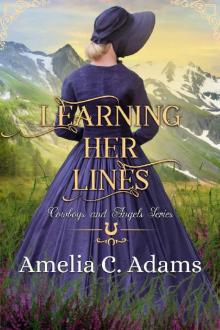 Learning Her Lines
Learning Her Lines Connections
Connections The Turn of a Wheel (Kansas Crossroads Book 17)
The Turn of a Wheel (Kansas Crossroads Book 17) Just Desserts (Main Street Merchants Book 4)
Just Desserts (Main Street Merchants Book 4) An Agent for Anna
An Agent for Anna An Agent for Esme
An Agent for Esme A Handyman for Helen
A Handyman for Helen Scented Sensibility
Scented Sensibility Addie's Adventurer
Addie's Adventurer Defying the Darkness
Defying the Darkness Riding the Rails
Riding the Rails Sugar And Spice (Main Street Merchants Book 7)
Sugar And Spice (Main Street Merchants Book 7) An Agent for Cynthia
An Agent for Cynthia In The Stars (Main Street Merchants Book 6)
In The Stars (Main Street Merchants Book 6) Moonlight With Alice (The Matchmaker's Ball Book 3)
Moonlight With Alice (The Matchmaker's Ball Book 3) Five Golden Rings (Main Street Merchants Book 3)
Five Golden Rings (Main Street Merchants Book 3) Between The Lines (Main Street Merchants Book 5)
Between The Lines (Main Street Merchants Book 5) An Agent for Lucy
An Agent for Lucy Jessica (Seven Sisters Book 2)
Jessica (Seven Sisters Book 2) A Passing Glance
A Passing Glance Pet Peeves
Pet Peeves RNWMP: Bride for Joel
RNWMP: Bride for Joel Bowing to Betsy (The Matchmaker's Ball Book 11)
Bowing to Betsy (The Matchmaker's Ball Book 11) Rebekah (Seven Sisters Book 4)
Rebekah (Seven Sisters Book 4) A Joyful Noise (Kansas Crossroads Book 14)
A Joyful Noise (Kansas Crossroads Book 14) Her Second Chance Hometown Groom
Her Second Chance Hometown Groom A Christmas Promise (Kansas Crossroads Book 16)
A Christmas Promise (Kansas Crossroads Book 16) Bride for Samuel
Bride for Samuel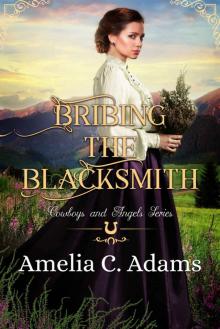 Bribing the Blacksmith (Cowboys and Angels Book 9)
Bribing the Blacksmith (Cowboys and Angels Book 9) RNWMP: Bride for Samuel (Mail Order Mounties Book 12)
RNWMP: Bride for Samuel (Mail Order Mounties Book 12) Tea for Two
Tea for Two The Bitter and the Sweet (Kansas Crossroads Book 9)
The Bitter and the Sweet (Kansas Crossroads Book 9) Frank (Seven Sons Book 6)
Frank (Seven Sons Book 6) A Cattleman for Cora
A Cattleman for Cora Paislee's Path (River's End Ranch Book 48)
Paislee's Path (River's End Ranch Book 48) Accidental Agent (River's End Ranch Book 3)
Accidental Agent (River's End Ranch Book 3)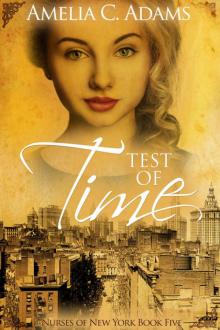 Test of Time (Nurses of New York Book 5)
Test of Time (Nurses of New York Book 5) RNWMP: Bride for Michael (Mail Order Mounties Book 24)
RNWMP: Bride for Michael (Mail Order Mounties Book 24) Loving the Landlord
Loving the Landlord The Dark and the Dawn (Kansas Crossroads Book 3)
The Dark and the Dawn (Kansas Crossroads Book 3) Candy Crush
Candy Crush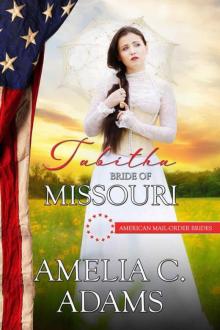 Tabitha: Bride of Missouri (American Mail-Order Bride 24)
Tabitha: Bride of Missouri (American Mail-Order Bride 24) Touch of Tenderness (Nurses of New York Book 3)
Touch of Tenderness (Nurses of New York Book 3) Lucky Lifeguard (River's End Ranch Book 28)
Lucky Lifeguard (River's End Ranch Book 28) Heartstrings (Brody Hotel Book 2)
Heartstrings (Brody Hotel Book 2) Heart of Hearts (Nurses of New York Book 4)
Heart of Hearts (Nurses of New York Book 4) Hope_Bride of New Jersey
Hope_Bride of New Jersey A Careless Wind (Kansas Crossroads Book 7)
A Careless Wind (Kansas Crossroads Book 7) An Agent for Emily (The Pinkerton Matchmaker Book 28)
An Agent for Emily (The Pinkerton Matchmaker Book 28) A Twisted Fate
A Twisted Fate Delivering Destiny (River's End Ranch Book 23)
Delivering Destiny (River's End Ranch Book 23)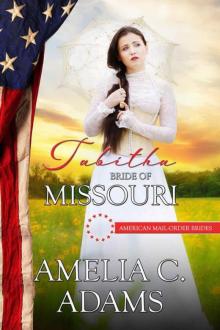 Tabitha_Bride of Missouri
Tabitha_Bride of Missouri A Wrangler for Wynonna
A Wrangler for Wynonna RNWMP_Bride for Peter
RNWMP_Bride for Peter An Unspoken Dream (Kansas Crossroads Book 13)
An Unspoken Dream (Kansas Crossroads Book 13) Generations
Generations Utah Sunrise (Rocky Mountain Romances Book 1)
Utah Sunrise (Rocky Mountain Romances Book 1) Bride for Jonathan
Bride for Jonathan Bribing the Blacksmith
Bribing the Blacksmith A Clean Slate (Kansas Crossroads Book 4)
A Clean Slate (Kansas Crossroads Book 4) Hope: Bride of New Jersey (American Mail-Order Brides 3)
Hope: Bride of New Jersey (American Mail-Order Brides 3) Rugged Rockclimber (River's End Ranch Book 8)
Rugged Rockclimber (River's End Ranch Book 8) RNWMP_Bride for Michael
RNWMP_Bride for Michael RNWMP: Bride for Joel (Mail Order Mounties Book 4)
RNWMP: Bride for Joel (Mail Order Mounties Book 4) Tea For Two (Cowboys & Angels Book 15)
Tea For Two (Cowboys & Angels Book 15) Sweet Georgia Peach
Sweet Georgia Peach RNWMP: Bride for Peter (Mail Order Mounties Book 20)
RNWMP: Bride for Peter (Mail Order Mounties Book 20) A Clear Hope (Kansas Crossroads Book 5)
A Clear Hope (Kansas Crossroads Book 5) Meredith's Mistake (Grandma's Wedding Quilts Book 4)
Meredith's Mistake (Grandma's Wedding Quilts Book 4) RNWMP_Bride for Samuel
RNWMP_Bride for Samuel The Whisper of Morning (Kansas Crossroads Book 6)
The Whisper of Morning (Kansas Crossroads Book 6) RNWMP: Bride for Jonathan (Mail Order Mounties Book 8)
RNWMP: Bride for Jonathan (Mail Order Mounties Book 8) Santa's Shopkeeper (River's End Ranch Book 18)
Santa's Shopkeeper (River's End Ranch Book 18) A Broken Wing (Kansas Crossroads)
A Broken Wing (Kansas Crossroads)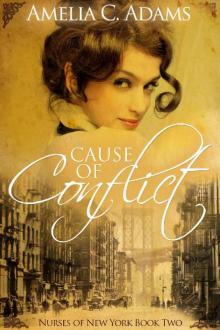 Cause of Conflict (Nurses of New York Book 2)
Cause of Conflict (Nurses of New York Book 2) A Free Heart
A Free Heart A New Beginning
A New Beginning The Calm of Night (Kansas Crossroads Book 10)
The Calm of Night (Kansas Crossroads Book 10)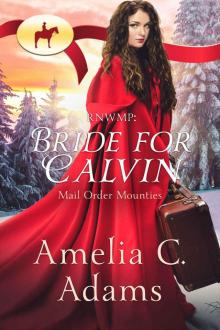 Bride for Calvin
Bride for Calvin Sea of Strangers (Nurses of New York Book 1)
Sea of Strangers (Nurses of New York Book 1)